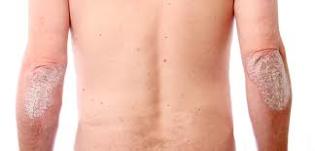Psoriasis - noninfectious disease of the skin, which expresses itself in the formation of red peeling spots, covered hands to silvery scales. As a general rule, the psoriasis develops in young people aged 20 to 30 years. The disease is not a threat to human life, but cause severe suffering of a psychological nature, up to social isolation.

The causes of the disease
The causes of psoriasis, to date, up to the end not identified. There are some factors that bind with the onset of psoriasis. However, in and of themselves, these factors are not able to cause psoriasis, only in combination with the other may serve as the impetus for developing this disease:
- genetic predisposition;
- reduction of the protective properties of the organism;
- disorders psycho-emotional support;
- pathology of the endocrine system.
It is assumed that psoriasis can be the consequence of an imbalance in the functioning of the immune system. The skin is thicker accumulates a large number of T lymphocytes, which leads to chronic inflammation of the affected areas. The histological examination of psoriatic material confirms the presence of high concentration of immune cells in the affected areas, which confirm the immunological factor in the development of psoriasis.
A genetic predisposition to psoriasis confirm the presence of mutations in different sites on the DNA. These areas are responsible for the development of the immune cells of the lymphocytes T. The break up of these sites may trigger the development of psoriasis. In this way, if the parents are suffering from psoriasis, the risk of developing this disease in the child equal to 50%, and even more. Scientists have also bind the development of psoriasis already in adults with mutations of certain genes.
Also the cause of the development of psoriasis can be stress, which leads to a worsening of the symptoms of the disease. Psycho-emotional disorder is capable of initiating the release of hormones in the blood, which causes a series of biochemical reactions, which in their turn promote the appearance of various rashes on the skin.
The research of the etiology of psoriasis has shown that many patients are violations on the part of the endocrine system and the reproductive system, in addition, there is the violation of the process of formation of the pigmentation.
You can also talk about factors that support and contribute to the development of psoriasis: ecology, injury, unbalanced diet, poor living conditions, violation of the fundamentals of hygiene.
You can say that psoriasis is hereditary disease: in its development which is devoted a complex of the above reasons.
The symptoms of the disease and of its species
Psoriasis has some common specific symptoms that help to diagnose with accuracy the disease. In psoriasis develop three characteristic of state:
- "wax" stains that when you try to curettage nail, skin, and for its consistency similar to wax and stearin;
- red glossy surface, which is formed after the separation of flakes and platelets. Usually called a terminal of the film;
- a very characteristic sign of psoriasis — symptom "bloody dew". If you scrape all the scales and platelets, on the surface of the skin you will perform the small bloody points similar to drops of dew.
Often psoriatic rashes localized in the flex area of the large joints, in the area of the armpits, scalp, groin, under the breasts, on the nails. The disease begins with the appearance of small, itchy skin rash symmetric, then merge into a single large cluster, occupying large areas of skin. The itching becomes not tolerable, and the department of flakes causes the appearance of "blood dew".

The diagnosis of psoriasis causes a certain degree of complexity, just as there are many types of this disease. Psoriasis has the following forms:
- vulgaris (psoriasis vulgaris);
- the plaque psoriasis;
- pustular psoriasis;
- psoriasis flexor surfaces;
- spot or psoriasis in the form of drops.
Each type of psoriasis has its own code in the international qualification of diseases (ICD-10). Each type of disease has its own signs, symptoms and causes.
The treatment of psoriasis
The treatment of psoriasis is a great deal of difficulty, as well as the disease has a chronic course with remissions. However, in our time, it is possible to improve the condition of the patient, reducing the clinical manifestations. The treatment of psoriasis, it is built in the total application of the medical therapy, local therapy, the application of physiotherapy techniques and immunomodulatory.
In the first place are used topical medications for external use. The composition of these medicines are substances containing:
- Glucocorticosteroid hormones, which are able to actively prevent the division of cells in the skin, but also reduce inflammation, itching, and depression of the immune system.
- Medicines based on vitamin D, the efficiency of which is manifested in a coupe with ultraviolet irradiation.
- Drugs with activated zinc, which quickly eliminate the itching and redness of the skin.
For the system (in general), the treatment of psoriasis apply:
- Corticosteroids, that suppress the symptoms of inflammation and regulate the metabolism.
- Cytostatic prevent the division of uncontrolled cells.
- Immunomodulatory eliminate the dysfunction of the immune system.
- Non-steroidal medicines that eliminate only the symptoms of the disease: inflammation and itching, without affecting the causes of the disease.
Physiotherapy treatment encompasses a series of procedures:
- PUVA-therapy. This method is to use a photoactive chemical that is used together with the wavelength of the ultraviolet rays.
- Hirudotherapy. The use of leeches for the treatment of psoriasis, which improve the flow of blood.
- Cryotherapy. The method consists in the immersion of the patient in a few minutes in a car with much lower air temperature. This method allows to effectively eliminate the event of outbreaks of inflammation and reduces itching.
The treatment of psoriasis the traditional methods, sometimes with good results. Before proceeding to the treatment necessarily requires the consultation of a dermatologist. The physician must be aware of the methods of treatment and totally agree with them.
The complication and the prevention of psoriasis
Complications of psoriasis manifests itself with serious diseases, which are very difficult to treat: psoriatic arthritis, pustular psoriasis and psoriatic eritrodermia. The prevention of the disease comprises regenerative measures:

- sanatorium therapy;
- a well-balanced diet;
- healthy sleep;
- renovated in chronic foci of infection;
- compliance with the rules of hygiene;
- a minimum of physical exercise.























